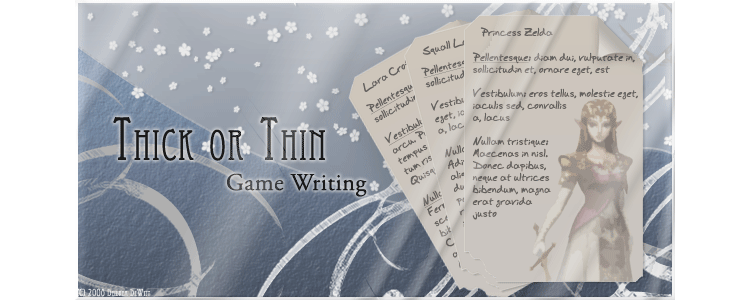
So, I believe I've mentioned that I hate cliches. I don't believe I've mentioned what I think a cliche really is.
Here is the standard public definition to a cliche: "Plot element that has been drastically overused."
Here's my definition of a cliche: "A well known plot element that has been used often and BADLY."
Let's take a brief look at some over-used plot elements:
--> Town is burnt to the ground (Legend of Dragoon)
--> Villain is the hero's father/uncle/brother/sister
--> Female protagonist finds out she either is or isn't a princess (Just about any Final Fantasy)
--> The main villain isn't really the head villain, but a pawn of the head villain (Again, any Final Fantasy)
--> The guy you OBVIOUSLY killed, is, in fact, alive
--> The main character is an orphan (practically every game/movie/book ever)
--> Your best friend betrays you (Bully)
--> You get shot at by 50 different guys, never eat a bullet, and end up taking out all 50 of them with a stick, a pack of bubble gum, and a photograph.
Let me point out that I'm not against any of these plot elements. I'm only against them if they're used badly. What do I mean by that? If you use any of these plot elements as filler, plot devices, or without any real reason, that's when it becomes a horrible cliche.
It's not whether or not your element has been used or not. It's how it's brought to life. It's how it fits into the story. It's how it's narrated. It's angles you put on it.
So let's take a look at when it's ok to use these plot elements.
When Cliches Are OK to Use
#1- When they're used sparingly
One or two of these elements is fine by itself. 5 or 6 of these elements say to me that you really didn't try to come up with a story at all. All of these elements say to me that you're either a n00b that wanted to make a game and feel special about yourself, or a big company that just needed extra funds to pay for extra pizza parties.
#2- When they're critical for the story to make sense
I would rather have a good, solid plot that has a few typical elements, then a weak one that I can blow a ton of holes in. If you avoid a cliche just to avoid a cliche, and do something that's totally out of character, I believe that stands out more then a overly-used plot element. It's more important that the plot is smooth.
If the villain is a pyro, it would make sense to have him burn down a city. If my best friend is mentally unstable, it makes sense that he would betray me. If you're going to use a well-known plot element, set it up well.
#3- When it's for a younger audience
Kids haven't been around long enough to criticize a cliche. If they do understand something that's been done before, they don't really care. Games meant for younger audiences aren't expected to have highly complex plots. Now, don't get me wrong. Just because younger audiences don't have complex storylines doesn't mean that they shouldn't have original ones. My point is, I'm not going to care as much about cliches if I'm playing a game by Nintendo that's rated "E" as opposed to a Sony game that's rated "M."
#4- When it's not really a "surprise"
Most of the cliches I mentioned above try to be "GASP" moments. This effect probably only works on half of the audience. If you want to do a plot element such as the guy you shot being alive or your best friend betrays you, a good way to do it is to let the audience know while your characters are in the dark.
A good example of this is Kingdom Hearts. We all could see that Riku was going to betray Sora, but we were interested in how he was going to betray him. The betrayal was obvious, but his plans weren't. It was definitely a good angle to take.
Other Notes
--> If your plot has many elements that have been used before, that doesn't make it a bad story. The only real downside to having a ton of cliches in a story is that you'll get tougher criticizm. Probably from me.
--> If you're going to use a cliche element, make sure that it completely makes sense. Foreshadow it. Work on character development to set it up. Work on backstories.
--> I have read totally original stories that-- I thought-- were complete crap. People try harder to be original then to make a good story. Don't do that.
Here is the standard public definition to a cliche: "Plot element that has been drastically overused."
Here's my definition of a cliche: "A well known plot element that has been used often and BADLY."
Let's take a brief look at some over-used plot elements:
--> Town is burnt to the ground (Legend of Dragoon)
--> Villain is the hero's father/uncle/brother/sister
--> Female protagonist finds out she either is or isn't a princess (Just about any Final Fantasy)
--> The main villain isn't really the head villain, but a pawn of the head villain (Again, any Final Fantasy)
--> The guy you OBVIOUSLY killed, is, in fact, alive
--> The main character is an orphan (practically every game/movie/book ever)
--> Your best friend betrays you (Bully)
--> You get shot at by 50 different guys, never eat a bullet, and end up taking out all 50 of them with a stick, a pack of bubble gum, and a photograph.
Let me point out that I'm not against any of these plot elements. I'm only against them if they're used badly. What do I mean by that? If you use any of these plot elements as filler, plot devices, or without any real reason, that's when it becomes a horrible cliche.
It's not whether or not your element has been used or not. It's how it's brought to life. It's how it fits into the story. It's how it's narrated. It's angles you put on it.
So let's take a look at when it's ok to use these plot elements.
When Cliches Are OK to Use
#1- When they're used sparingly
One or two of these elements is fine by itself. 5 or 6 of these elements say to me that you really didn't try to come up with a story at all. All of these elements say to me that you're either a n00b that wanted to make a game and feel special about yourself, or a big company that just needed extra funds to pay for extra pizza parties.
#2- When they're critical for the story to make sense
I would rather have a good, solid plot that has a few typical elements, then a weak one that I can blow a ton of holes in. If you avoid a cliche just to avoid a cliche, and do something that's totally out of character, I believe that stands out more then a overly-used plot element. It's more important that the plot is smooth.
If the villain is a pyro, it would make sense to have him burn down a city. If my best friend is mentally unstable, it makes sense that he would betray me. If you're going to use a well-known plot element, set it up well.
#3- When it's for a younger audience
Kids haven't been around long enough to criticize a cliche. If they do understand something that's been done before, they don't really care. Games meant for younger audiences aren't expected to have highly complex plots. Now, don't get me wrong. Just because younger audiences don't have complex storylines doesn't mean that they shouldn't have original ones. My point is, I'm not going to care as much about cliches if I'm playing a game by Nintendo that's rated "E" as opposed to a Sony game that's rated "M."
#4- When it's not really a "surprise"
Most of the cliches I mentioned above try to be "GASP" moments. This effect probably only works on half of the audience. If you want to do a plot element such as the guy you shot being alive or your best friend betrays you, a good way to do it is to let the audience know while your characters are in the dark.
A good example of this is Kingdom Hearts. We all could see that Riku was going to betray Sora, but we were interested in how he was going to betray him. The betrayal was obvious, but his plans weren't. It was definitely a good angle to take.
Other Notes
--> If your plot has many elements that have been used before, that doesn't make it a bad story. The only real downside to having a ton of cliches in a story is that you'll get tougher criticizm. Probably from me.
--> If you're going to use a cliche element, make sure that it completely makes sense. Foreshadow it. Work on character development to set it up. Work on backstories.
--> I have read totally original stories that-- I thought-- were complete crap. People try harder to be original then to make a good story. Don't do that.
--> If Legend of Zelda uses the same exact story for every single game, and each game does well. Meditate on that for a bit.
Creepy image of Link (C) Nintendo


